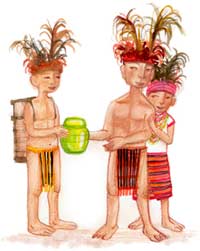THE STRANGER'S
MAGIC BASKET
By Lin Acacio-Flores
The sun shone day after
day. That meant famine
for the Ifugao. The rice plants
had dried up on the
terraces that stretched up
the mountains. On these
terraces, so the elders said,
one could climb up, up
to the very doorstep of the
the Kabuniyan, the
Skyworld.
"Maybe we did not sacrifice
enough chickens and
wine to the gods when we planted
the rice. The
almighty ones are displeased,"
the priestess said.
At night, the wind set the
pine trees sighing.
In their windowless huts,
under their red and black
blankets, the Ifugaos, muttering,
wished that sleep
would come. Then they could
forget their hunger, just
for the night.
There were some Ifugao who
had inherited more
rice land than others did,
and one of them was
Kimmayong of Pau. He worked
hard on his long stretch
of terraces. The dryness had
not spared his plants.
But his granary was still
full with the harvest
of the previous season, gathered
before the long
drought had come.
One morning, Kimmayong woke
up and looked at the
sky. "Still no sign of
rain," he told his wife
as she
took the fragrant steamed
rice from the pot and placed
it in a wooden bowl.
 Kimmayong,
his wife, and his two small
sons
Kimmayong,
his wife, and his two small
sons
squatted around the bowl to
take their breakfast.
Even the smaller boy took
care not to spill a single
rice grain.
A man whom Kimmayong had
never seen before appeared
at
the doorway. The stranger
carried a basket pack, a
pahiking, on his wide back,
and in his strong hands
was a jar.
"Come eat with us,"
invited Kimmayong. His sons
moved
so that the stranger could
sit with them.
Kimmayong's wife thought
it would be nice to have such
jar.
Kimmayong glanced at the
stranger's backpack and saw
that it was not too big and
that it would be easy to
fill. Kimmayong was not stingy,
but he could not
afford to be over-generous.
No one knew when the
famine would end.
Kimmayong looked at the stranger's
face. He thought
he saw a good man, and so
he said, "I will give
you
rice to fill your pahiking,
but first, do come and
share our meal."
So the stranger, without
telling his name, put down
the jar and the pack, and
sat with them.
And then then older boy,
who was but five years old,
and who sat next to the stranger,
noticed something
strange. In between handfuls
of rice with which the
man fed himself, he would
pass some rice stealthily
towards his back, and then
the rice would disappear.
The boy looked at his parents
but hey had not noticed
anything.
The smaller boy, the toddler
who could talk as yet,
had stopped eating. He was
staring, open-mouthed, at
the space just behind the
stranger.
Then the older boy suddenly
saw what his brother was
staring at. Like the mists
floating around the
mountain on a cold morning,
there was a wraith-like
figure behind the visitor,
a tiny creature reaching up
with both hands for the rice
that hastily thrust to
him. As soon as the rice was
in his hands, it
vanished.
Soon the bowl of rice was
empty, and the men rose to
the granary. The boys were
naturally quiet boys, and
said nothing to their mother.
They watched her as she admired
the jar, wiped it with
the end of her striped kain
shirt and placed it in a
corner where no one would
knock it down.
"I will weave a shallow
basket, a stand for it,"
she
said.
The stranger walked after
Kimmayong on the narrow
trail to the granary.
Kimmayong couldn't hear the
stranger's footsteps since
he walked so lightly, so at
a curve in the path,
Kimmayong glanced over his
shoulder to make sure he
hadn't been left behind.

The stranger was waving his
hand as if motioning to
someone trailing behind to
follow them. But there was
no one else.
At the door of the granary
was the bul-ol, the
god-image that Kimmayong had
carved from hardened
fern-root. The bul-ol was
the guardian of the rice.
Only the owner of the granary
should enter it, no one
else, so the stranger stood
just outside the door.
There was still plenty of
grain, the piles reaching
up
to the shoulders of Kimmayong.
He saw that no one,
not even the mice, had stolen
anything.
A few sheaves of palay and
his pack will be full,
thought Kimmayong. He took
a bundle from the top,
handed it to the stranger
who thrust it into his pack.
Kimmayong gave him two, three...
five, seven, ten
bundles, but the pack was
still half-empty.
Kimmayong had given all the
bundles of the top layer
of the granary, and still
the pahiking was not full.
The sweat poured from Kimmayong's
brow, and his heart
started to pound. What kind
of man was this, and what
kind of bottomless basket
did he have?
Did he, Kimmayong, dare to
ask the stranger if he
could stop? Now Kimmayong
was pulling out the last
bundles of the second layer
of rice. At last, when
half of the contents of the
granary had been handed
over the stranger, he said:
"That is enough,
Kimmayong; you will be rewarded
for your generosity."
Then the stranger slung his
pack over his back,
slipping the rattan straps
easily over his arms as if
the pack were light and empty.
He walked away, towards the
terraces, his footsteps
making not a sound, not a
footprint in the dust.
Kimmayong staggered back
to his hut. He was tired.
His mind was like a whirlwind
in his head. His sons
were under the hut, near the
posts that held up the
hut, looking upward at the
side of the mountain.
"Look! Father!"
the older boy said.
The sheaves of rice, the
bundles from Kimmayong's
granary, golden in the sun,
were moving upright, up
and over the dikes of the
terraces, single-file in a
long procession.
"Do you see them? The
little men carrying the rice?"
the boy said, and the toddler
nodded, yes, he could
see them.
But the father couldn't see
anything, only the sheaves
waving and moving on. And
they watched the sheaves
climb up the mountain and
disappear into the
mysterious rock called Bugwong.
Kimmayong realized that the
stranger must have been a
bibiyo, someone from the spirit
world.
If one visits the land of
the Ifugao, one might be
lucky enough to meet the great-great-granddaughter
of
Kimmayong. If you are good
and she likes your face,
she might show you the jar
that came from the
stranger. She might tell you
this story and how good
luck blessed Kimmayong's life
and the lives of his
sons and their children.
(Retold with permission from
"Heirloom Jars in
Philippine Rituals" by
Artemio Barbosa, A Thousand
years of Stoneware Jars In
the Philippines by Valdes,
Nguyen Long and Barbosa.)